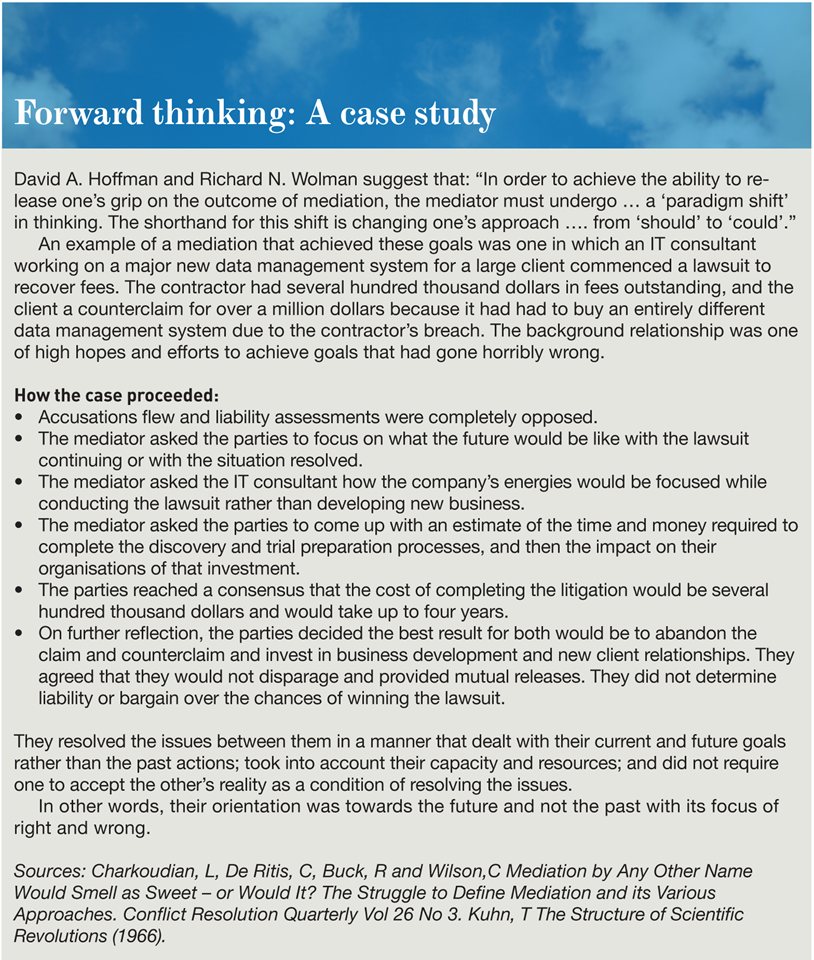There is no question that ADR is useful for solving disputes, but are lawyers and mediators entering into negotiations with the right mindset? Frank Handy and Steve Lancken believe they must look to the future instead of the past.

The discussion about whether ADR is useful to resolve disputes, litigated or not, is over. There remains, however, a great deal of debate about different perspectives and ‘moves’ that mediators use. There is continuing confusion about what should happen and what actions by the mediator are useful.
Lawyers are usually involved in mediation in the context of litigation. The typical negotiation paradigm of litigation drags a mediator away from best intentions into participation in a zero-sum game in which litigants try to convince the other party that they will lose the lawsuit so that they can bludgeon ‘the opponent’ into giving up.
Over thousands of mediations I am yet to see the advocacy method of negotiation (your side is completely wrong and I am completely right) successful to the extent that one party puts up the white flag.
If this method of negotiation is all that mediation is about, then it is little wonder that some mediations consist of the parties sitting in separate rooms trading offers based on completely conflicting views of the merits and strength of their cases. No one expects these offers to be accepted. Reactive devaluation sets in, so even a genuine offer is viewed with disdain. The constant argument about who was legally correct exacerbates tension and the mediator ends up as a passive messenger for lawyers. Not what you want of a highly-paid retired judge...
And then parties and their lawyers ‘give up’, indicating that they are too far apart so they should simply continue with the lawsuit.
No one would suggest that when trying to craft a peace deal during an armed conflict the only thing you talk about is who will win the war. Why is this the way mediation is approached? If that approach had been taken in the mediation of the Centro or Optus class actions, or the David Jones/Fraser-Kirk litigation, would an agreement or resolution have been reached?
The advocacy method does resolve some disputes and no one alleges bad faith. But why are mediators and lawyers not taken aback? I think it is because they prepare to participate in this way.

Poor prep
Preparation for mediation can amount to lawyers emphasising the strength of the case so that the clients “don’t have to worry about anything”. A high-level review of the evidence and legal arguments supporting their position, plus a summary of the perceived holes in the opposition’s case, is all that is done. I sometimes see this approach in boilerplate issues papers.
What is missing from preparation is discussion about the purpose and goals of the lawsuit, or perceptions of a party about the motivations, goals, and concerns of the other. There isn’t an exploration of what a good solution to the dispute might be, nor is there an assessment of the value of the case (including consideration of potential for success), against the opportunity, financial and emotional costs of pursuing it.
Is there another way?
Mediators struggle to break free of the zero-sum game, and to help parties break free of it. Those who are intensely disappointed with the zero-sum game in mediation have usually developed a very different view of the opportunities. In particular they:
In other words, everyone looks to the future.
Mediation sometimes devolves into a debate about how the litigation process would answer the problem and participants miss the chance to have a different kind of conversation; one that would leave the litigation question unresolved but answer the more comprehensive and critical issues far more effectively.
To have this conversation mediators must understand, and be far more explicit about, the assumptions in play and be willing to explore the implications of them. Lawyers need to understand and be less fearful of the possibilities in a future-focused approach.
To go back to my first point, mediators should give accurate explanations of how they practise mediation so that participants will get what they want and understand how they want to participate. Or if you are a lawyer seeking a mediator, be very sure of the primary orientation, towards the past which excludes many answers, or towards a better future.
Looking over your shoulder to the past means that you may not see the crevice you are walking into, or the pot of gold that might be shared if only you look forward to find it.
Steve Lancken and Frank Handy are members of the Trillium Group, mediators and conflict management experts. Visit www.thetrilliumgroup.com.au
(i) Charkoudian, L, De Ritis, C, Buck, R and Wilson,C Mediation by Any Other Name Would Smell as Sweet – or Would It? The Struggle to Define Mediation and its Various Approaches. Conflict Resolution Quarterly Vol 26 No 3.
